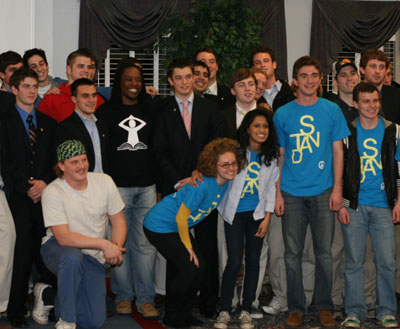
This guest blog post was written by Omekongo Dibinga, a spoken word artist, rapper, actor, and motivational speaker.
Last week, I traveled to the University of Richmond (UR) to perform my spoken word poetry and hip-hop on the Congo. I was invited by Maria Sebastian of the school’s STAND chapter and Matt Sobel of the UR’s Sigma Chi Fraternity. I was impressed with the hospitality they showed me, and overwhelmed by the enthusiasm the students showed for learning about the Congo and the conflict minerals issue.
The STAND chapter there has less than 10 active members, and the Sigma Chi Fraternity members there told me they didn’t know much about the Congo. Despite these seeming obstacles, over 200 people attended – leaving standing room only – on a rainy Wednesday night. As I walked into the Commons Student Center, I saw NCAA games on the TVs and of course Winter Olympic activity. All of the campus life distractions were still taking place that night but these students came out to learn how they could stop violence and destruction in the Congo. That to me is incredible and speaks to what a small group of dedicated people can do to affect change.
What was also great to see was that the students followed up the next day with a “cell-out” protest. Participants turned off their phones and left messages on their voicemails explaining that their phones are off in order to draw attention to how our electronics are supporting violence in the Congo. As we posed for the picture attached to this post, one student asked: “How many people died for that camera to work?” Another student said: “I was thinking the same thing.”
That summed it up for me. We will win this fight because we are getting people here in the United States, who wouldn’t think about violence in Congo on a daily basis, to consider how their everyday devices are helping fuel a war targeting innocent men, women, and children on the other side of the world. It’s a reality people don’t see on television, and we must work to raise awareness and suggest meaningful solutions.
The challenges in Congo are part of me; a day doesn’t pass when I don’t think of the people there and the many years of violence they have endured. Getting people like the students at University of Richmond thinking about how Congo is part of them is proof positive that the movement we’re building for Congo is on the right track, and we must continue spreading the word. I can’t wait to visit the next school as part of the RAISE Hope for Congo Speakers Tour!

